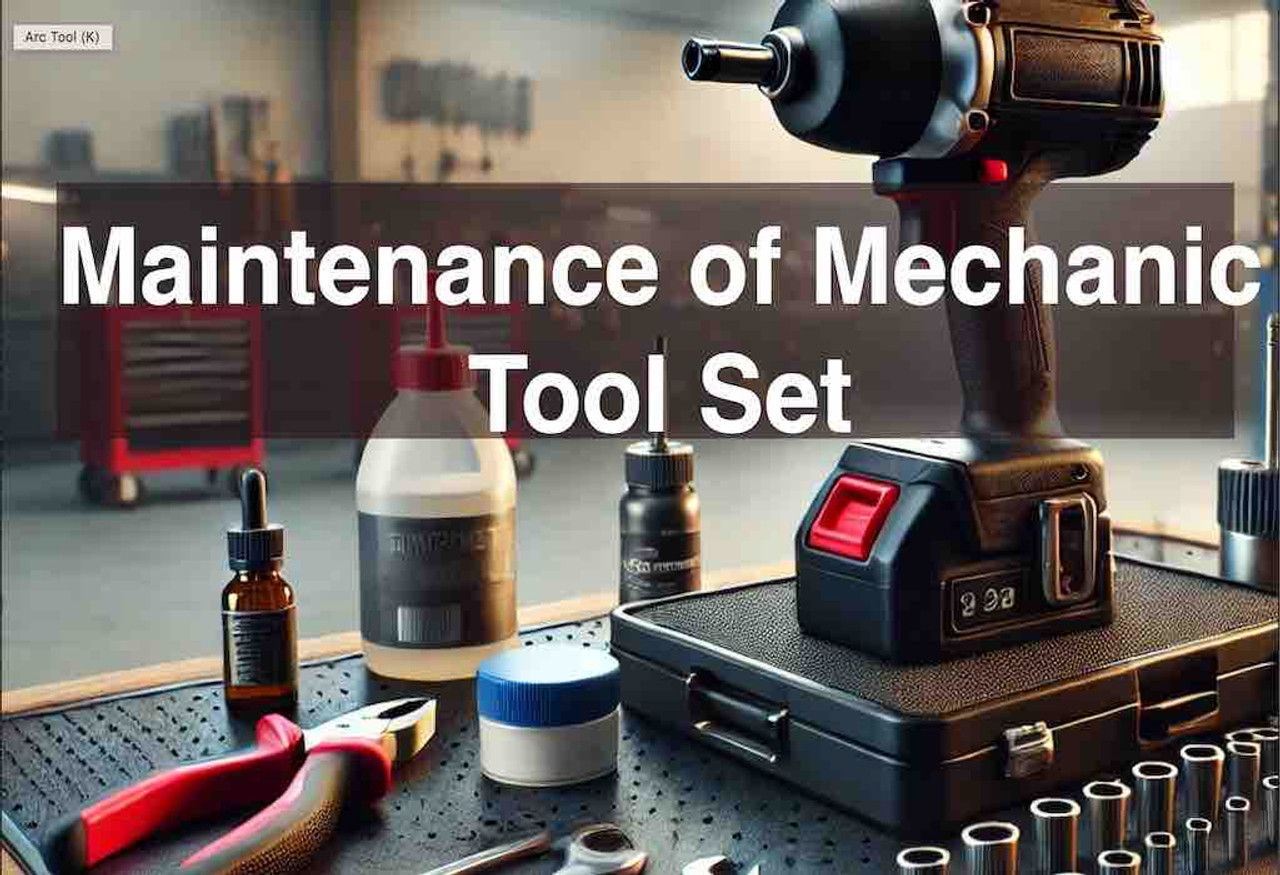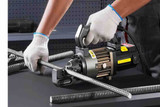Maintenance Tips for Mechanic Tool Kits: Maximizing Longevity and Performance
A well-maintained mechanic tool kit is the backbone of any successful automotive repair operation. Whether you're a professional mechanic or a passionate DIY enthusiast, proper care and maintenance of your tools are essential for ensuring their longevity, reliability, and optimal performance. This comprehensive guide will explore expert maintenance tips for mechanic tool kits, helping protect your investment and enhance productivity.
Key Takeaway
Proper maintenance of your mechanic tool kit ensures longevity, safety, and optimal performance. By implementing a regular cleaning and maintenance routine, using appropriate storage solutions, and addressing issues promptly, you can significantly extend the life of your tools and improve your efficiency as a mechanic.
The Importance of Tool Maintenance
Regular maintenance of your mechanic tools offers numerous benefits:
- Extended tool life
- Improved safety during use
- Enhanced accuracy and precision
- Reduced replacement costs
- Increased productivity and efficiency
By implementing a proper maintenance routine, you'll not only save money in the long run but also ensure that your tools are always ready for any job.
Read Related Article: Maximizing workshop Tool Lifespan: Maintenance Tips for Prolonged Use
Essential Maintenance Tips for Common Mechanic Tools
Wrenches and Sockets
Wrenches and sockets are the workhorses of any mechanic tool kit. To keep them in top condition:
- Clean after each use: Remove dirt, grease, and debris with a clean cloth or degreaser.
- Inspect regularly: Check for signs of wear, cracks, or deformation.
- Lubricate moving parts: Apply a light coat of machine oil to ratchet mechanisms and adjustable wrench threads.
- Store properly: Use socket organizers and wrench racks to prevent damage and rust.
Screwdrivers
Proper care of screwdrivers ensures precise fits and prevents damage to fasteners:
- Maintain sharp tips: Use a file to restore damaged or rounded tips.
- Clean handles: Remove grease and grime to maintain a secure grip.
- Magnetize when needed: Use a magnetizer tool to improve handling of small screws.
- Store upright: Use a tool roll or dedicated screwdriver holder to protect tips.
Pliers and Cutters
Keep your pliers and cutters in prime condition with these tips:
- Clean and dry thoroughly: Prevent rust by removing moisture after each use.
- Lubricate joints: Apply a drop of machine oil to maintain smooth operation.
- Sharpen cutting edges: Use a sharpening stone to restore dull cutting surfaces.
- Adjust alignment: Ensure jaws meet correctly for optimal gripping and cutting.
Torque Wrenches
Accurate torque wrenches are crucial for proper fastener tightening:
- Calibrate regularly: Have your torque wrench professionally calibrated annually.
- Store at the lowest setting: Release tension on the spring when not in use.
- Avoid using it as a breaker bar: Preserve accuracy by using it only for final tightening.
- Keep clean and dry: Prevent internal corrosion by proper storage and maintenance.
Power Tools
Electric and pneumatic tools require specific care:
- Clean air vents: Ensure proper cooling by keeping vents free of debris.
- Check cords and hoses: Inspect for damage and replace if necessary.
- Lubricate as directed: Follow manufacturer guidelines for internal lubrication.
- Store in cases: Protect from dust and impacts with proper storage solutions.
Creating a Maintenance Schedule
Implementing a regular maintenance schedule is key to keeping your tools in top shape:
- Daily Maintenance:
- Clean tools after each use
- Inspect for damage or wear
- Proper storage at the end of the day
- Weekly Maintenance:
- Deep clean, heavily used tools
- Lubricate moving parts
- Organize and inventory your kit
- Monthly Maintenance:
- A thorough inspection of all tools
- Sharpen cutting edges as needed
- Check the calibration of measuring tools
- Annual Maintenance:
- Professional calibration of torque wrenches
- Deep cleaning and refurbishment of power tools
- Replacement of worn or damaged tools
Proper Cleaning Techniques
Effective cleaning is essential for tool maintenance:
- Degreasing:
- Use a quality degreaser for heavy oil and grease removal
- Apply with a brush or cloth, then rinse and dry thoroughly
- Rust Removal:
- For light rust, use steel wool or a wire brush
- For stubborn rust, consider chemical rust removers
- After rust removal, apply a protective coating
- Ultrasonic Cleaning:
- Ideal for intricate parts and hard-to-reach areas
- Use an appropriate cleaning solution for the material
- Compressed Air:
- Use to remove dust and debris from power tools and tight spaces
- Wear eye protection when using compressed air
Readers like How to Properly Maintain and Extend the Lifespan of Your Pneumatic Tools
Proper Storage Solutions
Correct storage protects your tools and extends their lifespan:
- Tool Chests and Cabinets:
- Invest in quality storage with smooth-rolling drawers
- Use drawer liners to prevent tool movement and damage
- Foam Inserts:
- Custom-cut foam inserts keep tools organized and protected
- Quickly identify missing tools for improved inventory management
- Climate Control:
- Store tools in a dry environment to prevent rust
- Consider a dehumidifier for high-humidity areas
- Portable Tool Bags:
- Use padded bags for transporting tools to job sites
- Ensure proper organization to prevent damage during transit
Protecting Your Investment with Quality Care Products
Using the right care products can significantly extend the life of your tools:
- Lubricants:
- Choose appropriate lubricants for different tool types
- Consider dry lubricants for environments where oil might attract dirt
- Rust Inhibitors:
- Apply rust inhibitors to bare metal surfaces
- Use vapor corrosion inhibitors for long-term storage
- Cleaning Solvents:
- Select solvents that are safe for tool materials
- Use biodegradable options for environmentally friendly maintenance
- Protective Coatings:
- Apply clear coatings to prevent corrosion on rarely used tools
- Consider renewing coatings annually for maximum protection
The Role of Proper Usage in Tool Maintenance
Proper tool usage is an often-overlooked aspect of maintenance:
- Use tools only for their intended purpose
- Apply the correct amount of force to prevent damage
- Choose the right size tool for each job to avoid strain
- Educate all users on proper handling and care techniques
Troubleshooting Common Tool Issues
Identifying and addressing issues early can prevent costly repairs:
- Ratchet mechanism slipping:
- Disassemble, clean, and re-lubricate the mechanism
- Replace worn pawls or gears if necessary
- Screwdriver tips rounding:
- Reshape with a file or replace if severely damaged
- Use the correct size and type for each fastener
- Pliers not gripping properly:
- Clean jaw surfaces and adjust alignment
- Replace if jaws are excessively worn
- Power tool performance decline:
- Check and clean air vents
- Inspect and replace brushes if applicable
- Have a professional service if issues persist
When to Replace Tools
Even with excellent maintenance, tools eventually need replacement:
- Safety concerns: Replace immediately if cracks or structural issues are present
- Excessive wear: Tools with worn surfaces that affect performance should be replaced
- Repeated repairs: If a tool requires frequent maintenance, replacement may be more cost-effective
- Outdated technology: Consider upgrading to newer, more efficient tools when appropriate
Ready to elevate your tool maintenance game? Tend Industrial Supplies offers a comprehensive range of high-quality mechanic tools, storage solutions, and maintenance products to keep your kit in shape. Visit Tend Industrial supplies to explore our selection, or contact our expert team at sales@tendsupplies.com for personalized advice on tool care and maintenance. Invest in the longevity of your tools today and experience the difference that proper maintenance can make in your work!









